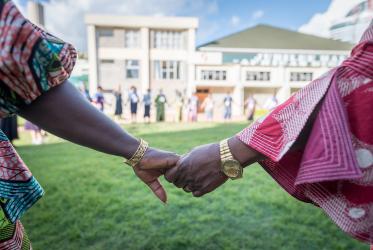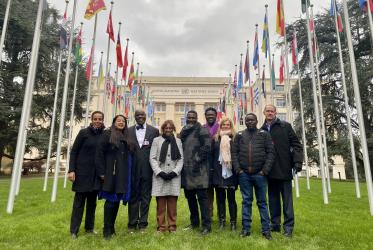by Fridah Muyale-Manenji
"Shonyala okhumanya inzu yowasio tawe". This literally means that you cannot manage or know the affairs of the house of your neighbour. This is a saying the people of Ebukanga village, Kisa location in Kakamega district of the Western Province of Kenya usually use when respecting one's privacy and affairs. At times this saying is also used when people assume they know what is going on in somebody's home. Here in Zimbabwe, the country in which "I came to cook" (in my culture, when a woman is married, she has gone to cook), they say "Chakafukidza dzimba atenga" (What covers the house is the roof). This saying is almost similar to the first one in the sense that it implies that it is only the people who live in the house who know what is happening in their lives, no matter what assumptions or concepts people outside the house have of them.
For some reason, when ECHOES* asked me to write an article on globalization and its impact on culture, I spent a few days wondering how to approach this topic, and eventually decided to write as an African woman involved in the African struggle, and as a mother and wife who believes in justice. So if this article is biased in any way, it is because I have chosen to write from this particular perspective. Culture is such a broad term and when it comes to my mind, I think of values and norms people have which make them live in a particular way. A way of living in a particular community. In other words, the sum total of all things that refer to religion, roots of people, symbols, language, songs, stories, celebrations and all expressions of our way of life. It encompasses food production, technology, architecture, kinship, the way we relate to each other, political and economic systems and all the social relationships these entail.
Culture is dynamic...
Each culture has its own personality. The fact that we are all human does not mean that we are all the same. To ignore this would be destroying God's own beautiful rainbow made from the many colours of cultural diversity. Culture is learned. This is the most common attribute. The European beckons while holding his hand with the fingers uppermost, while the African does so with the fingers pointing down. Each has learned his/her way. Such learning does not take place through natural inheritance. It is not genetically transmitted. Rather, it takes place by a process of absorption from the social environment or through deliberate instruction. No culture is possible without a language. It is bound up with language. This is an important prerequisite and therefore to kill a language is to kill a culture.
Culture is never static. It is dynamic. Every moment we are being transformed, always growing - like the cells in our bodies. It changes exactly the same way as human beings change. We cannot romanticise our culture. Our grandfathers did not walk on the same top soil as we do and our children will have different soil. I would never dare tell my mother where to place the flower pot in the living room. Today my daughter can easily change the position of the flower pot in our living room even without consulting me. This transformation is so gradual and not sudden or abrupt. Culture is a continuous process of change but in spite of the change, culture continues giving a community a sense of identity, dignity, continuity, security and binds society together.
The effect globalization has had on culture is immense and diverse. It has affected people's cultural behaviours in different ways. People have had to change their living ways. The loud echoing advertisement rhythms of the famous Coca-Cola drinks can be heard across boundaries in towns, cities and townships and even in remote rural areas where drinking water is a problem to get. Globalization in Africa involves one fundamental project: that of opening up the economies of all countries freely and widely to the global market and its forces.
|
The demands of globalization For Africa, all the central planks of the process of globalization have been implemented over the past decade-and-a-half as structural adjustment programmes. Countries have deregulated foreign investment, liberalised their imports, removed currency controls, emasculated the direct economic role of the state, and so on. The results have been to further undermine the internal, national productive capacity, social security and democratic integrity of these countries. So that is basically how globalization has impacted on Africa. In Africa, women have mostly been involved in farming, in employment as civil servants, and in industry. They have also been involved in small-scale entrepreneurships. No doubt, these sectors have been severely affected by the introduction of trade liberalization. Women on this continent contribute the most critical factor in agricultural production and agriculture. Yet liberalization has failed to ensure the availability of credit, agricultural inputs such as fertilisers and insecticides at affordable prices. The marketing of their produce has been thrown in the hands of businessmen whose sole objective is profit maximisation. The result - food security in Africa is highly threatened. Women constitute 60% percent of the communal farmers in Zimbabwe. In rural areas the impact has been so serious that rural urban migration has increased to unfortunate proportions. This in turn has led to the increase of squatters in urban areas and crime which affects mostly women and children. In Zimbabwe, some women have resorted to cross-border trade. This has had its own social and cultural repercussions. Children in this case are left out of parental care and the number of rape cases on young children has become an alarming cause of concern. In Zimbabwe alone, there is an average of four reported cases of rape every day. In other cases there have been reports of married women getting involved in extra-marital affairs once they cross the border while the spouses they have left behind indulge in the same, complicating and worsening the AIDS pandemic situation. Children no longer sit around the fireplace in the evening to listen to stories that promote the values of respect, integrity, peace, love and unity, even in the rural areas where this sort of environment would fit best. People - men, women and children - are all engrossed and embroiled in the struggle for survival - the struggle to get a bowl of mealie-meal to fill the tummy at least for the day. In the township where I stay, children as young as six years can be seen selling oranges, tomatoes and other basic foodstuffs as late as 8.00 pm. During my grandmothers' generation, most African communities had a strong policy on food security. If you walk through my village, you will find a silos in each family compound. Today, most of these are empty - people have been forced into a situation where they are living from hand to mouth. Even the middle-class working elite have run into a habit of borrowing their salaries/wages even before they receive them. There is so much to spend on! But the amazing issue is that of ignorance. Even the rich and well-to-do have no clue about the system that has invaded the African continent. Or even if they are aware, they have either chosen to overlook the overall implication or have decided that they are also benefactors of the system. The sale of a shirt made outside Zimbabwe is more certain than a locally manufactured one. "Import" is the in term. Ladies who wear perfume from Paris and shoes from Italy tend to receive more respect than those wearing a locally manufactured brand. Children in rich families are too busy involved in video games, international schools that offer English and other "international" languages, television and movies whose content is 90% from outside the country. Song and dance has become characterised with themes of AIDS, orphans, suffering, drought and war. These have been neutralised with the western beats of Michael Jackson et al. The youth prefer the western beats to the local artists and hair styles, shoes and clothing keep to the trends on the western fashion scene. Those who are slow are left behind and everyone seems to be in such a big rush not to remain behind. Women's economic activities have therefore been highly affected by globalization. In Malawi, whereas before rice was produced in Malawi and sold in most Southern African countries, rice is now brought in from Asia and sold at much cheaper prices than the locally produced one. The production of the local one is therefore forced to stop. Women are very concerned about the impact of economic structural adjustment programmes on their human rights. It is not just a question of economics, it is the whole issue of human dignity. Dignity is inherent in the fact of being a human being. With this, we have also witnessed tremendous changes in the global economy and in the political climate that contextualises it. The current neoliberal model has resulted in the introduction of policies aimed at eliminating all obstacles to the "free" exercise of economic activity across boundaries including trade liberalisation, the deregulation of production, the labour market and the market of goods and services and the implementation of regional and international agreements. |
|
Before the advancement of free economic activity on the national, regional and global levels, most of the African economies were heavily regulated by the state. Under this system, they introduced such import and export restrictive business practices as import and export licencing, increased import duties, taxes or levies on import transactions, allocation of foreign exchange to essential goods, import and export quotas and other prohibitions. This forced the creation of local and locally manufactured goods produced from local materials. Self-reliance was encouraged. However, this has now been replaced by donor-driven deregulation, economic liberalisation and privatisation of the national economic activities. The argument has been that this new policy will bring about faster export and economic growth, which will enable developing countries to repay the mounting external debt burden accumulated since the independence of these countries.
Inequity
It is unfortunate that the "globalization theory" assumes that all players, men and women, rich and poor, will be affected equally. Furthermore, it also assumes that international trade opportunities open up equally to small scale firms, infant industries and the giant transnational corporations and cartels.
However the seven years of globalization indicate otherwise because international trade is also to do with people's livelihoods and their most basic social and economic rights. For millions of Africa's poorest people, trade is part of daily life, and a crucial determinant of welfare. When a people's social and economic rights and patterns are affected, their culture is overall affected too. Trade which is built on the unacceptable levels of social inequities to vulnerable communities and groups, or causes global ecological or environmental damage and disregards our obligations to future generations is not conducive to sustainable development.
Established and large companies such as TNCs came in and brought in their finished goods at much cheaper prices than those of our own manufacturers, thus forcing many local industries to close down. In Zimbabwe, the clothing sector was hardest hit with the closure of the local Cone Textiles, which retrenched hundreds of workers. These workers were family breadwinners with children in schools and houses to pay rent for. Because of the tight labour market, most of them are frustrated and disillusioned with no work and money. The importation and cheap selling of second-hand clothes from Europe has forced many women out of their businesses. In Kenya, the women who were involved in the manufacturing of the famous "kiondos" (sisal bags) were negatively affected when the sisal bags were produced en masse in Japan and sold in East Africa and the surrounding countries at low prices.
In Mali, foreign investors were able to take over the major revenue enterprises such as tobacco and textile industries, not to mention the only national airline. In Cameroon, banks, agricultural ventures and the national airlines were taken over by foreign investors. The African market has become the dumping ground for all kinds of goods from developed countries and from the East, all in the name of free trade. In Zambia, the spirits, motor and textile industries are almost dead. In Tanzania the leather and textile industries have almost collapsed.
Massive unemployment is a common phenomenon in Africa. In Zambia for example, retrenchments and liquidations have led a staggering number of over 200,000 people out of employment over a period of five years since 1992. Zimbabwe, Botswana, Malawi, Kenya, Uganda, Tanzania and other African countries are not different. This has had a direct impact on Africa's cultural traits.
In many countries, it has always been the responsibility of the man to go out and fend and provide for his family. This has changed. Men and women both leave home in search of the available labour. In fact, in cases where there are massive retrenchments, you now find men at home while the woman goes to work. This has hence affected the household responsibilities, where you find change of roles when a man has to wash and look after the children. In cases where the man goes to work, the woman is forced to become involved in supplementary activities such as sewing, selling vegetables and knitting to complement her husband's salary. In these countries, women have suffered disproportionately from the impact of globalization. There are very many men who have been retrenched too, but when you look at the statistics you can see the difference. A company in Lesotho, for instance, was required to lay off 50% of its work force, and it ended laying off all the women workers. Under ESAP, states are required to reduce public spending. The immediately affected areas are health and education. In most of our African societies, it is the responsibility of the women to take care of the health not only of themselves, but also of the children in the home.
Many girls have dropped out of school because their families cannot afford to pay all the school fees. Zimbabwe has not yet seen the extent to which this can go, but people from Ghana or Uganda who have lived under SAPs for many years and whose countries have been quoted by the World Bank as "success stories" will tell you of the majority of a whole generation who have not gone to school - the majority of whom are women. In Africa, there is a limit to your capacity to enjoy your rights if you have not gone to school. It means that you may not get a job and therefore your economic rights (which are basic human rights) are affected. The first challenge facing women today is education. Education must empower women with knowledge of their rights and how to seek redress should such rights be violated.
In conclusion, the North must revise its conception of development. Economic growth without social and cultural justice cannot be our idea of development. It is imperative that development is measured in terms of the quality of human life, which can be reflected in, for example, better education, health and life expectancy for every single member of society. This is only possible if men and women are equally empowered, in theory and in practice. And the North has a crucial role to play in this process. Anything that falls short of restoring peoples' dignity, sense of identity, continuity and security should never be accepted. Africa needs to learn to respect the dissenting voice of its own people. And at the same time, the North needs to take heed to the saying of the African people "Shonyala okhumanya inzu yowasio tawe".
* ECHOES is an occasional publication of the WCC Justice, Peace, Creation team





